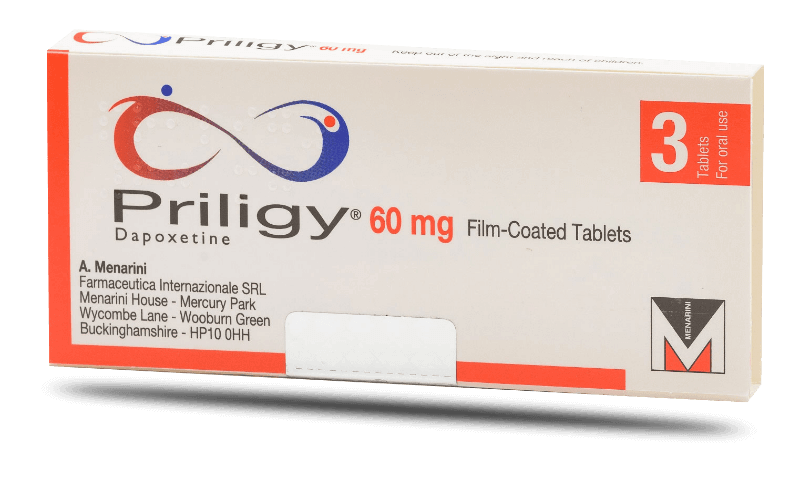torsineen
Dapoxitiene PRILIGY 60 mg delay ejaculation 24 Tabs
Couldn't load pickup availability
Each film-coated tablet contains dapoxetine hydrochloride equivalent to 60 mg dapoxetine.
Posology
Adult men (aged 18 to 64 years)
The recommended starting dose for all patients is 30 mg, taken as needed approximately 1 to 3 hours prior to sexual activity. Treatment with Priligy should not be initiated with the 60 mg dose.
Priligy is not intended for continuous daily use. Priligy should be taken only when sexual activity is anticipated. Priligy must not be taken more frequently than once every 24 hours.
If the individual response to 30 mg is insufficient and the patient has not experienced moderate or severe adverse reactions or prodromal symptoms suggestive of syncope, the dose may be increased to a maximum recommended dose of 60 mg taken as needed approximately 1 to 3 hours prior to sexual activity. The incidence and severity of adverse events is higher with the 60 mg dose.
If the patient experienced orthostatic reactions on the starting dose, no dose escalation to 60 mg should be performed (see section 4.4).
A careful appraisal of individual benefit risk of Priligy should be performed by the physician after the first four weeks of treatment (or at least after 6 doses of treatment) to determine whether continuing treatment with Priligy is appropriate.
Data regarding the efficacy and safety of Priligy beyond 24 weeks are limited. The clinical need of continuing and the benefit risk balance of treatment with Priligy should be re-evaluated at least every six months.
Elderly (age 65 years and over)
The efficacy and safety of Priligy have not been established in patients age 65 years and over (see section 5.2).
Paediatric population
There is no relevant use of Priligy in this population in the indication of premature ejaculation.
Patients with renal impairment
Caution is advised in patients with mild or moderate renal impairment. Priligy is not recommended for use in patients with severe renal impairment (see sections 4.4 and 5.2).
Patients with hepatic impairment
Priligy is contraindicated in patients with moderate and severe hepatic impairment (Child-Pugh Class B and C) (see sections 4.3 and 5.2).
Known CYP2D6 poor metabolizers or patients treated with potent CYP2D6 inhibitors
Caution is advised if increasing the dose to 60 mg in patients known to be of CYP2D6 poor metabolizer genotype or in patients concomitantly treated with potent CYP2D6 inhibitors (see sections 4.4, 4.5 and 5.2).
Patients treated with moderate or potent inhibitors of CYP3A4
Concomitant use of potent CYP3A4 inhibitors is contraindicated. The dose should be restricted to 30 mg in patients concomitantly treated with moderate CYP3A4 inhibitors and caution is advised (see sections 4.3, 4.4 and 4.5).
Method of administration
For oral use. Tablets should be swallowed whole to avoid the bitter taste. It is recommended that tablets be taken with at least one full glass of water. Priligy may be taken with or without food (see section 5.2).
Precautions to be taken before handling or administering the medicinal product
Before treatment is initiated, see section 4.4 regarding orthostatic hypotension.
Share


